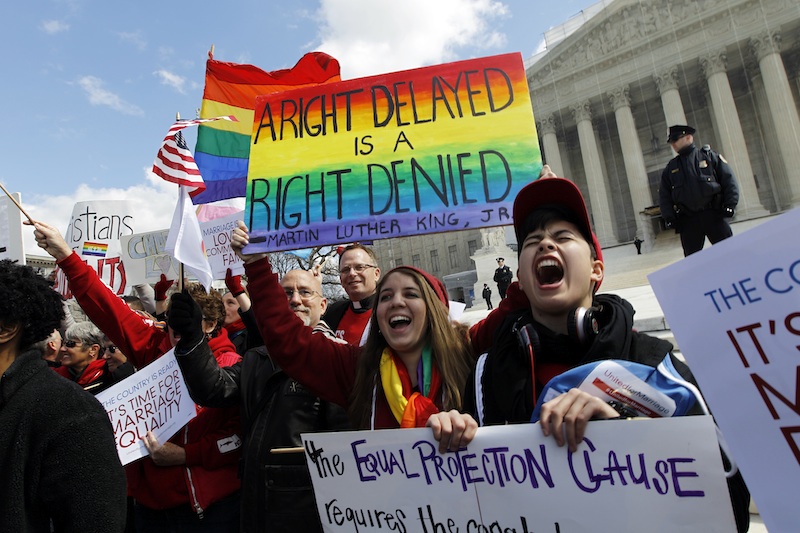Marriage equality supporters are understandably ecstatic that the Supreme Court has declared section three of DOMA unconstitutional.
But for a subset of same-sex partners, the ruling won’t truly guarantee them equal treatment under the law.
The nature of the court’s DOMA decision, combined with its decision to punt the California Prop 8 case about whether there’s a constitutional right to gay marriage, will ultimately create a sort of three-tiered status for same-sex partners.
The first tier is same sex married couples who live in states that allow same sex marriage. They gained the most from today’s decision. The third tier is same sex couples who live in states that do not recognize same sex marriage. They gained very little direct benefit from the court striking down DOMA. The middle tier is where things get complicated: same sex couples who marry in one state but then choose to move (or more likely are forced to, for work, family, or other reasons) to a state that doesn’t allow same sex marriage.
“Currently, eligibility for some federal benefits turns on whether a marriage was valid where it took place, while eligibility for other federal benefits depends on whether the person’s marriage is respected where the person lives,” Shannon Minter, legal director for the National Center for Lesbian Rights, wrote in an email to TPM Wednesday. “People who are legally married to same-sex partners in states that permit same-sex couples to marry will be eligible for all federal benefits based on marriage. But people who are legally married to same-sex partners in states that do not respect such marriages will be eligible for some federal benefits, but likely not all. Pending further guidance by the relevant federal agencies, the answer to this question for couples who live in states that do not respect their marriage is uncertain.”
As Adam Winkler, a constitutional scholar at UCLA, explained in a phone interview after the decision was handed down, “for all the talk that DOMA is dead, the Court did not strike down any provision of DOMA other than Section 3. Section 2 remains good law. Section 2 is the section that says states don’t have to recognize marriages from other states. Long-standing constitutional doctrine has allowed states to decline to recognize marriages from other states.”
Thus, same-sex partners now find themselves in a legal position that’s similar to the position interracial couples found themselves in decades ago — allowed to wed in some states, but into marriages that won’t be recognized by others.
“As a general rule, a person who legally married a different-sex partner will be considered married in all states,” Minter said. “But that is not true for same-sex spouses. Many states have enacted constitutional amendments that prohibit the state from respecting the marriages of same-sex couples who validly married in another place. It is not yet clear whether same-sex spouses who live in states that do not respect their marriages will be eligible for federal benefits that turn on whether a marriage is valid where the couple or surviving spouse lives. At least in the short run, there are some federal benefits that same-sex couples in these states likely will not receive.”
For instance, Minter notes, “the determination of whether a surviving spouse gets Social Security spousal benefits is based on whether the person’s marriage is respected in the state where the person is living when she applies. Once the benefit has been granted, it would not be taken away if the person subsequently moved to a state that would not have recognized the marriage. In contrast, for example, a person may be eligible to take unpaid leave to care for an ill spouse in an equality state, but then lose that right if the couple moved to a non-equality state.”
Thus, if a same sex couples moves — or, for example, is required by condition of employment to move — from states where their marriages are recognized to states where they aren’t, they will likely lose some of their federal benefits.
This middle-status will also apply to foreign-married same-sex couples who immigrate to states that do not allow same sex marriage, and to binational couples as well.
However, today’s ruling resolves an arguably bigger issue that has bedeviled countless spouses struggling to immigrate to the U.S., and even threatened to tank the Senate’s immigration reform legislation earlier this year. Under DOMA, gay spouses of U.S. citizens were not eligible to apply for a green card. Tuesday’s ruling changes that.
“If you have a marriage that is valid in the state or country where you were married – regardless of where you live – that marriage makes you eligible to apply for a green card,” according to the advocacy group Immigration Equality.
But the benefits conundrum will apply to all same-sex couples who take up residence in states that don’t recognize their marriages, meaning some of the old problems with DOMA will remain in place. New legal challenges to DOMA on those grounds are likely, even as marriage equality advocates seek a constitutional right to same-sex marriage that would apply to each individual nationwide.










